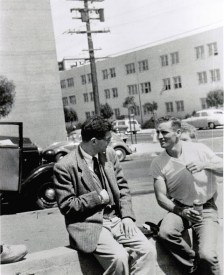 |
| Ginsberg & Cassady, 1955 |
It is comprised of three main narratives: Allen being interviewed in his apartment, Lawrence Ferlinghetti being tried in court for publishing Ginsberg’s poem “Howl” - which was considered obscene - and a trippy animation vision of the poem, word by word.
There are also minor flashback scenes in which Allen is portrayed with Jack Kerouac, Neal Cassady, and Peter Orlovsky, his lifelong partner.
While I think the animated part doesn’t transition well with the rest of the movie - in my opinion, it interrupts the flow with its psychedelic imagery, but it still adds to the movie in a way.
Eric Drooker’s drawing is pretty cool, and James Franco reads “Howl” in its entirety, familiarizing the viewer with Ginsberg’s poem. Overall, I think this movie has a lot of merit.
First of all, even though this wasn’t a Blockbuster movie (and thank god for that), it’s a good introduction to who Allen Ginsberg was and what he was all about.
I’m not sure how many people (who aren’t poetry aficionados) know who he was, but I think that people who are interested in literature, 20th century American History, homosexuality, and censorship of the press should definitely take a look at it.
For those of you who don’t know, Allen Ginsberg was a Jewish poet (amongst many other things) famously inspired by Walt Whitman. He grew up in Newark and became a notable part of the Beat Generation, both on the east and west coast.
Beginning in the late 1940s, after the Korean War, this group of writers explored a new type of writing in which traditional form was abandoned, stream-of-conciousness thought patterns were embraced, and “first thought, best thought” was adopted - self-editing was largely abandoned.
The Beats challenged the status quo, especially the prescribed notion of domesticity, and delved into a lifestyle filled with jazz, drugs & alcohol, travel, and lots of literature.
Among this group was William S. Burroughs, Jack Kerouac, Gregory Corso, Herman Huncke, Neal Casssady and Lawrence Ferlinghetti.
Among these notions of domesticity that Ginsberg eventually fought against was the idea of mandatory heterosexuality. Being openly gay in the 1940s & 1950s and writing so frankly about it was something that, to me, makes him such an important figure in history.
In his younger years, the desire to appear “normal” (haunted by his mother’s intermittent stays in mental hospitals and eventual lobotomy, it would make sense for anyone in that situation to desire normalcy) led to him to conceal his feelings for other males.
It wasn’t until he was in his early twenties that he painfully struggled to put his shyness aside and express his male desire. One of the main people responsible for helping Allen accept his own sexuality was Neal Cassady.
While Cassady himself was straight, he helped Allen embrace his love and desire. This is a minor theme in the movie, and Cassady - the “cocksman”, and “Adonis of a thousand lays” - is a large part of the poem “Howl.”
Much clearer and graphic of an example of their love affair was Ginsberg’s “Many Loves,” which in my opinion is one of Ginsberg’s most tender poems.
It reads: “So gentle the man, so sweet the moment, so kind the thighs that nuzzled/ against me smooth-skinned powerful, warm by my legs/ That my body shudders and trembles with happiness, remembering …”.
Their love affair did not last long, as Cassady wanted to remain platonic friends and pursue his many women.
Another notable, and much more dominant, theme in the movie is that of censorship. As mentioned, a good third of the movie takes place in court with Lawrence Ferlinghetti and his lawyer.
Many people considered literature experts are tried, and they are asked to explain the literary validity of the poem “Howl”. Because of the freedom of speech we enjoy today in the US, it is difficult to fathom that just sixty or so years ago, people were jailed because of what they said or wrote.
Lawrence Ferlinghetti, one of the Beat writers, created City Lights because it was near impossible for his friends to publish anything that they wrote due to the language they used.
The profanity, obscenity, and supposed lack of moral integrity banned Ginsberg and others from being published.
Once “Howl” was published under the City Lights Books label in 1956, Ferlinghetti was arrested and tried for accounts of obscenity the poem contained. For more information on Lawrence Ferlinghetti and City Lights Books, please see: http://www.citylights.com/ferlinghetti/.
The questions that the literary experts are asked during trial are ridiculous. Do you know what this poem is trying to say? Do you think the words used in the poem are necessary to convey what the writer was trying to say? Do you think this poem will influence literature in fifty years? What’s an “angel-headed hipster”?
Of course, anyone who knows anything about poetry will know that all of these questions are completely stupid and bizarre.
In poetry, what the poet says is open to interpretation, each word is selected carefully and vital to the entire piece, and there is no way of knowing what literature will be relevant in the future. Duh.
The parts in the film depicting the court trial pissed me off, and I wanted to go back in time and yell at them. However, this portrayal of the court scenes is a vital part of “Howl”, and it is scary to think of what life could be like today if cases like this hadn’t won.
Scary not only to imagine what literature would be like today, but also to think of how much longer we would have remained repressed from freely expressing the world as we see it.
No comments:
Post a Comment